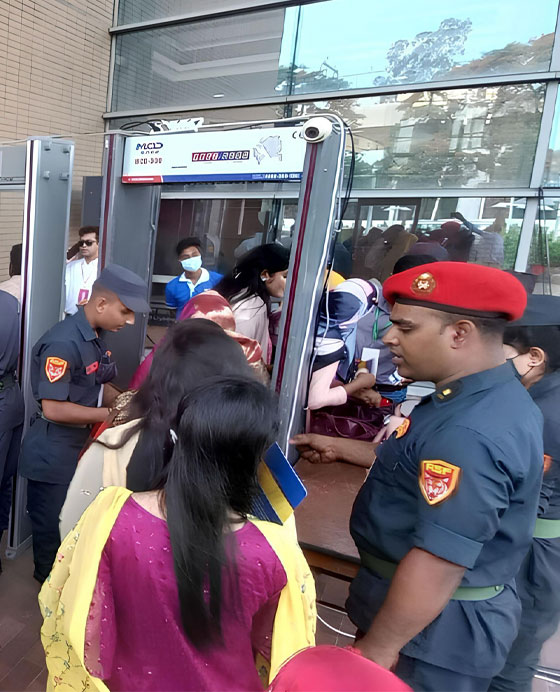Security personnel training is crucial for maintaining a safe and secure environment in various settings, ranging from corporate offices and government institutions to public venues and private residences. The importance of security personnel training can be attributed to several key factors:
Threat Identification and Prevention:
Trained security personnel possess the knowledge and skills to identify potential threats and security vulnerabilities. Through comprehensive training, they learn to recognize suspicious behavior, identify security breaches, and take appropriate preventive measures to mitigate risks. This proactive approach helps to prevent security incidents before they occur, safeguarding individuals, property, and valuable assets.
Emergency Response:
In the event of an emergency, such as a natural disaster, fire, or terrorist attack, security personnel play a critical role in maintaining order and ensuring the safety of individuals within their jurisdiction. Effective training equips them with the necessary emergency response protocols, evacuation procedures, first aid techniques, and crisis management skills. This enables security personnel to respond swiftly and effectively, minimizing harm and potential loss of life.
Crime Deterrence and Detection:
Well-trained security personnel act as a visible deterrent to criminal activities. They are trained to assess and monitor their surroundings, detect suspicious behavior, and take appropriate action. By implementing security measures and employing their training, they can effectively deter criminal elements, reducing the likelihood of theft, vandalism, and other illegal activities. Additionally, trained security personnel are betterequipped to gather evidence, report incidents, and cooperate with law enforcement agencies, contributing to the detection and prosecution of criminals.
Customer Service and Public Relations:
Security personnel often interact with the public, clients, and employees on a regular basis. Training programs emphasize the development of strong interpersonal skills, conflict resolution techniques, and customer service etiquette. This ensures that security personnel can handle difficult situations with professionalism, maintain positive relationships with those they serve, and provide assistance and guidance when required.
Knowledge of Security Technologies:
The field of security is constantly evolving, with new technologies and tools being introduced regularly. Proper training ensures that security personnel are up to date with the latest advancements in security technology, such as surveillance systems, access control systems, and alarm systems. They learn how to operate and utilize these technologies effectively, maximizing their effectiveness in securing premises and responding to security incidents.
Compliance with Legal and Regulatory Requirements:
Depending on the industry and jurisdiction, there are often specific legal and regulatory requirements governing security practices. Security personnel training ensures that individuals are well-versed in these regulations and understand their responsibilities and obligations. Compliance with these requirements not only helps to avoid legal liabilities and penalties but also demonstrates a commitment to maintaining a safe and secure environment for all.
Security personnel training is essential for developing a competent and capable security workforce. It equips individuals with the knowledge, skills, and tools necessary to identify threats, prevent security breaches, respond to emergencies, deter criminal activities, and maintain positive public relations. By investing in comprehensive training programs, organizations and communities can significantly enhance their security measures and ensure the well-being of their stakeholders.


Customer Service and Public Relations:
Security personnel often interact with the public, clients, and employees on a regular basis. Training programs emphasize the development of strong interpersonal skills, conflict resolution techniques, and customer service etiquette. This ensures that security personnel can handle difficult situations with professionalism, maintain positive relationships with those they serve, and provide assistance and guidance when required.
Knowledge of Security Technologies:
The field of security is constantly evolving, with new technologies and tools being introduced regularly. Proper training ensures that security personnel are up to date with the latest advancements in security technology, such as surveillance systems, access control systems, and alarm systems. They learn how to operate and utilize these technologies effectively, maximizing their effectiveness in securing premises and responding to security incidents.
Compliance with Legal and Regulatory Requirements:
Depending on the industry and jurisdiction, there are often specific legal and regulatory requirements governing security practices. Security personnel training ensures that individuals are well-versed in these regulations and understand their responsibilities and obligations. Compliance with these requirements not only helps to avoid legal liabilities and penalties but also demonstrates a commitment to maintaining a safe and secure environment for all.
Security personnel training is essential for developing a competent and capable security workforce. It equips individuals with the knowledge, skills, and tools necessary to identify threats, prevent security breaches, respond to emergencies, deter criminal activities, and maintain positive public relations. By investing in comprehensive training programs, organizations and communities can significantly enhance their security measures and ensure the well-being of their stakeholders.






